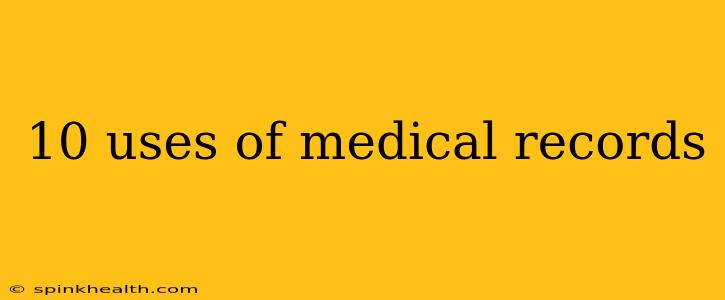10 Essential Uses of Medical Records: A Deep Dive into Patient Care and Beyond
Medical records. The very phrase evokes images of sterile offices and hushed tones. But these aren't just dusty files; they are the lifeblood of modern healthcare, a dynamic tapestry woven from vital information that impacts everything from daily patient care to groundbreaking medical research. Let's unravel the ten essential uses of these crucial documents, exploring their importance in a comprehensive way.
1. Direct Patient Care: The Foundation of Treatment
This is the most obvious, and arguably the most important, use. Imagine a doctor treating you without knowing your allergies, previous surgeries, or current medications. Impossible, right? Medical records provide the complete picture of a patient's health history, enabling doctors to make informed diagnoses, prescribe appropriate treatments, and monitor progress effectively. This is the foundation upon which all other uses are built.
2. Tracking Progress and Outcomes: Measuring Success
Medical records aren't static documents; they're living chronicles of a patient's journey. By meticulously documenting treatments, responses, and any changes in condition, doctors can track the effectiveness of interventions, identify potential complications early, and adjust treatment plans as needed. This longitudinal perspective is essential for optimizing patient care and improving outcomes.
3. Facilitating Communication Among Healthcare Providers: A Seamless Network
Imagine a patient seeing multiple specialists – a cardiologist, an oncologist, and a primary care physician. Without a centralized record, information would be fragmented and potentially contradictory. Medical records act as a vital communication bridge, ensuring all healthcare providers are on the same page, contributing to coordinated and efficient care.
4. Supporting Informed Consent: Empowering Patients
Before any procedure or treatment, informed consent is paramount. Medical records provide patients with the detailed information they need to understand their condition, the risks and benefits of different options, and make autonomous decisions about their healthcare.
5. Public Health Surveillance and Disease Management: Protecting Communities
Aggregate data from medical records – stripped of identifying information, of course – plays a crucial role in public health initiatives. Tracking the spread of infectious diseases, identifying trends in chronic conditions, and implementing preventative measures are all reliant on the insights gleaned from this collective data.
6. Research and Development: Advancing Medical Knowledge
Anonymized data from medical records forms the bedrock of much medical research. Researchers analyze this data to identify patterns, understand disease mechanisms, and develop new treatments and preventative strategies. This ongoing research directly contributes to advancements in healthcare for future generations.
7. Billing and Insurance Claims: Ensuring Financial Transparency
Medical records are essential for generating accurate bills and submitting insurance claims. They provide the detailed documentation needed to support the charges incurred, ensuring timely and accurate reimbursement for healthcare services.
8. Legal and Regulatory Compliance: Adhering to Standards
Maintaining accurate and complete medical records is not just good practice; it's often a legal requirement. These records are vital in legal disputes, regulatory audits, and investigations, ensuring accountability and compliance with healthcare laws and regulations.
9. Quality Improvement Initiatives: Striving for Excellence
Regular reviews of medical records can identify areas for improvement within healthcare systems. Analyzing patterns of errors, delays, or inefficiencies can lead to the development of protocols and training programs aimed at enhancing the quality and safety of care.
10. Continuity of Care: A Consistent Experience Across Providers
Whether moving to a new city, switching insurance providers, or simply seeking a second opinion, medical records ensure continuity of care. This seamless transfer of information prevents gaps in treatment, minimizes redundancies, and ensures that patients receive consistent and comprehensive healthcare, wherever they may be.
This exploration demonstrates the far-reaching impact of medical records, extending far beyond the confines of a doctor's office. They are the cornerstone of modern healthcare, vital for individual patient care and the advancement of medicine as a whole.

